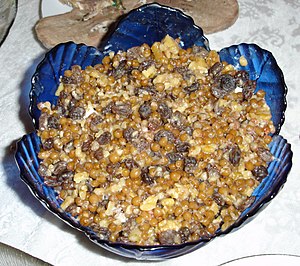Koliva

Colivă from wheat seeds with raisins
|
|
| Alternative names | Kollyva, Funeral Cake |
|---|---|
| Type | Ritual food |
| Main ingredients | Wheat kernels, honey or sugar |
| |
|
Koliva, kollyva, kollyba or Colivă (Greek: κόλλυβα pronounced [ˈkoliva]; Serbian: кољиво, koljivo(also interchangeably called жито, žito); Romanian: colivă; Bulgarian: коливо, kolivo; Georgian: კოლიო, kolio (also interchangeably called კორკოტი, korkoti and წანდილი, tsandili); Ukrainian: коливо, kolyvo), is boiled wheat which is used liturgically in the Eastern Orthodox Churches.
This ritual food most likely was used even before Christianity since the ingredients used have symbolic value relating to the Greek pantheon, though not to Christian iconography. In the Eastern Churches, koliva is blessed during the memorial service, mnemosyno, i.e. the Orthodox Memorial service, performed at various intervals after a death and on special occasions, such as the Saturday of Souls (ψυχοσάββατο) and funerals. It may also be used on the first Friday of the Great Lent, at Slavas, or at mnemosyna in the Christmas meal. In some countries, though not in Greece, it is consumed on non-religious occasions as well.
A similar food item is widely popular in Lebanon where it is known as snuniye and, more commonly, as berbara as it is prepared for Saint Barbara's day, December 4, which is celebrated with Halloween-like festivities.
...
Wikipedia
